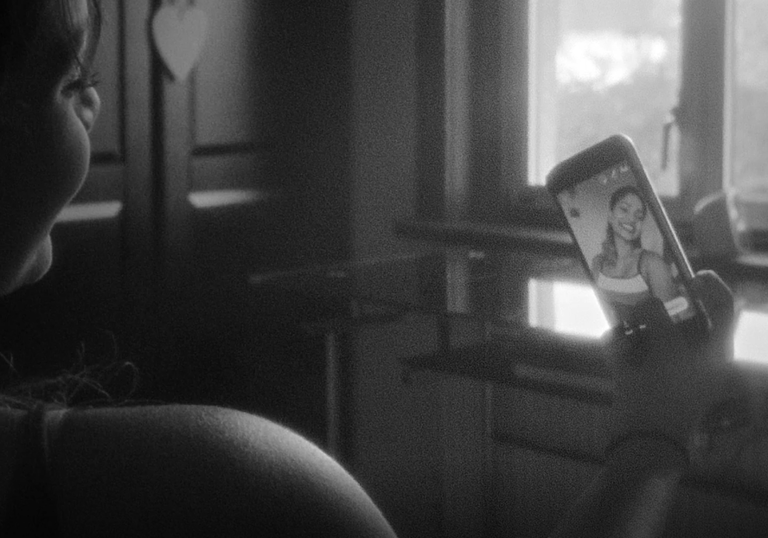How does your film respond to this month’s theme - identity?
‘Like Me’ explores how teenage girls use social media to create and construct their identity and how this impacts them. Initially I wanted to explore many forms of social media, but I decided to focus on Instagram to make the film stronger and simpler but also because of the element of visual curation and the specifically gendered pressures that teenage girls experience in relation to images of their bodies. It features interviews with three teenage girls aged from 17 to 19, the visuals are unsynced and shot on 16mm film.
The film aims not to place a judgement on social media or the way in which teenage girls use social media, it is more about trying to understand it from the girls perspectives of how they use it and why.
‘Like Me’ explores how teenage girls use social media to create and construct their identity
Social media habits interest me, there is a continuing debate about to what extent social media impacts society and how much society impacts social media in return - is it changing us or are we just using it like a tool?
I wanted to explore questions like - How important is a like? What does it mean to get likes? In the interviews I also asked the girls to read out all the comments they get and explain how many likes they get and why, however the final film focuses more on identity curation and creation rather than habits and use. I also discussed with them how they think the older generation views their use of social media and what they think of the implications of documenting their lives in this way.
The teenage girls explain and show the process they go through to construct and post an image on Instagram, they all share the image with their friends first and once the image is okayed, only then do they post it. A lot of people assume that we all use social media in a specific way, or even that there is a right or wrong way to use social media and to create an identity online. Whilst making this film I discovered that each person has a personal way of using social media and each person has their own way of relating to it and even though how we create our identity online might have universal qualities (e.g. the selfie), it is actually something incredibly intimate and personal.
How important is a like? What does it mean to get likes?
Can you explain the process behind the making of your film?
It was important for me to interview and film girls with varying backgrounds and also diverse ways of interacting with Instagram. Two of the girls would not consider themselves 'influencers', and one of the girls, although she does not like the term 'influencer', is considered by her followers to hold this status. I wanted to explore and juxtapose the varying responses of the teenage girls, two of whom use Instagram for personal reasons and an influencer who uses it for slightly more commercial reasons.
The film did transform a lot through the process of making it, especially in regards to how we shot the film and which 16mm film we used. The final film is black and white, however we shot on 16mm colour film. This led us (director of photography, colour grader and I) to research thoroughly into how to grade colour 16mm film as black and white. Our colour grader said that colour film transformed into black and white in post production yields richer blacks and a greater range of blacks giving us more control.
The film is meant to be minimal, with little sound design, no music and black and white aesthetic. I wanted the film to feel like an intimate conversation with the girls, a secret chat. The black and white is a response to the colourful over-saturation of a lot of the images on Instagram, and also a nod to the iconic films about female identity, like Persona (1966) by Ingmar Bergman.
Change is something you can aim for with art but sometimes it is something that happens inadvertently
I was so lucky to work with a talented crew. Due to the intimate subject matter, and the fact that we interviewed and filmed the girls in their personal bedrooms our crew was completely female. This is something personal to me, the women I collaborated with are incredibly talented in their specific fields, and I believe that there needs to be a push for diversity behind the camera, not just in front of the lens.
Do you think art really can be a vehicle for change?
Art can document, reflect and it can provoke. Change is something you can aim for with art but sometimes it is something that happens inadvertently and surprises you; I like the fact that art can cause ripples. I also think that the process of art and who makes the art, not just the outcome, needs to be included and considered as a possible vehicle for change.
About Jessica Bishopp
London-based filmmaker, artist and designer Jessica Bishopp experiments with a range of media. Jessica’s work has universal themes embedded in daily lives and thoughts; exposing the magic in the mundane. Her work has been exhibited at Somerset House, Institute of Contemporary Arts and the Science Museum London. Jessica’s films have screened at festivals such as Sheffield Doc/Fest, Aesthetica Short Film Festival and London Short Film Festival.

